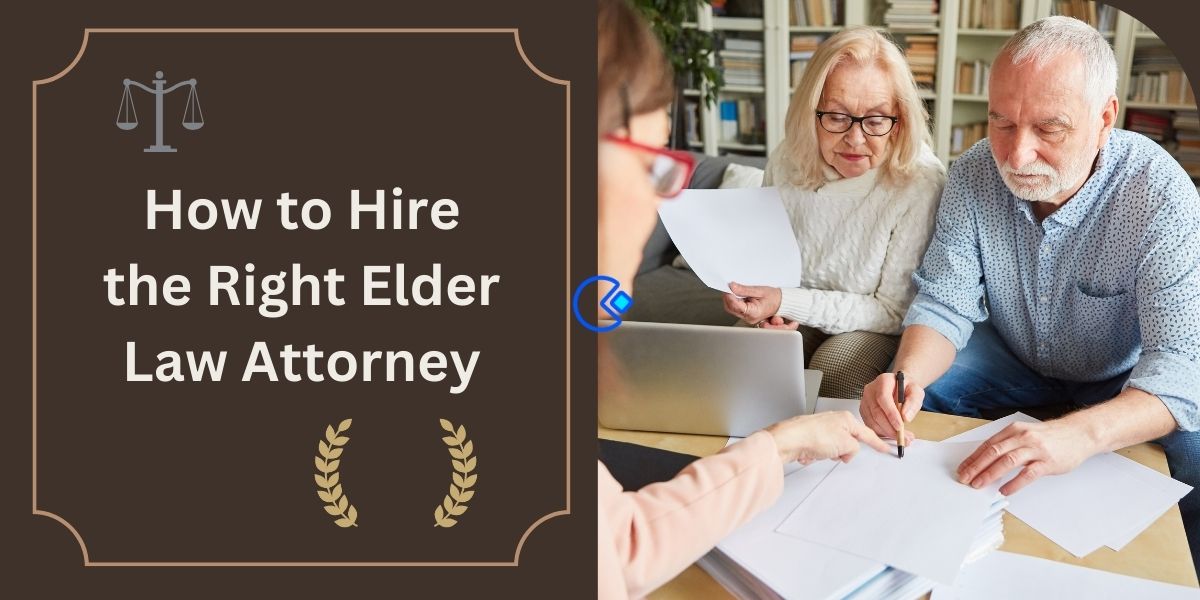Legal issues concerning healthcare, inheritance planning, and long-term care become increasingly significant as you or your loved ones age. To effectively navigate the complex environment of elder law, hiring an elder law attorney who specializes in this area is essential.
The internet has made it simple to locate law attorneys. However, simply because an attorney has a website and a phone number does not guarantee they are the ideal fit for you.
Choosing to hire an elder law attorney will require research and knowledge of the top questions to ask an elder law attorney. So let’s look more closely at the best measures you should take to hire an elder law attorney.
What is an elder law attorney?
Elder law attorneys assist seniors and caregivers of aging family members with legal issues that arise as people age. Some elder law attorneys have earned the National Elder Law Foundation’s Certified Elder Law Attorney (CELA) accreditation.
Many elder law attorneys specialize in Medicaid planning to assist people who have Alzheimer’s disease or another debilitating illness that may necessitate long-term care to protect their financial assets.
Most elder law attorneys can also prepare estate documents, including a durable power of attorney for health and medical needs, and establish trust for an adult child with special needs.
When Do You Need an Elder Law Attorney?
Specific conditions or issues that occur as people age often cause them to seek the advice of an elder law attorney. The following are some common instances that may require the use of elder law expertise:
- Estate Planning: Ensuring that your intentions disperse your assets and that your loved ones are financially safeguarded after your death necessitates meticulous planning and legal documentation.
- Long-Term Care Planning: Anticipating probable long-term care needs and establishing financial or living arrangements helps reduce stress and guarantee a smooth transition.
- Medicaid Planning: Navigating the complex Medicaid system to protect assets and qualify for long-term care benefits takes expert knowledge and direction.
- Guardianship Proceedings: Establishing legal guardianship for a person who can no longer make decisions for themselves can be a delicate and legally complex process.
How much do elder law attorneys charge?
The fee to hire an elder law attorney is determined by the legal services required, the city or region in which you live, and the level of expertise and education in elder law of the attorney.
The rates and examples below show how much you might pay for an elder law attorney’s services, depending on your required legal services:
- Guardianship and guardianship appointments: $350 to $650 per hour
- Wills and estate administration: $250 to $350 per hour; however, the charge would be lower—$100 to $150 per hour—if the job is done by paralegals under the supervision of an attorney.
- A comprehensive package of asset preservation agreements for the spouse of someone with Alzheimer’s disease who has $1.7 million in various deferred benefits, annuities, and assets, a paid-off mortgage on a $590,000 property, and adult children causing family conflict: $8,000 to $16,000
How to Find the Right Elder Law Attorney
1. Locate Candidates
The first step is to compile a list of elder law attorneys in your area. Here are some suggestions to make your search easier:
Visit the Life Care Planning Law Firms Association website to find elder law attorneys who practice life care planning, a type of elder law that includes care-related problems in the planning process.
Ask for recommendations. If you know someone who has used an elder law attorney, find out who they used and add their name to your list.
Referrals can also be obtained from professionals. General practice attorneys, financial consultants, CPAs, and insurance brokers are frequently knowledgeable about appropriate elder law attorneys.
2. Perform Due Diligence
After you’ve compiled your list of prospects, you may begin the vetting process. This level of due diligence begins with a review of each elder law attorney’s online presence.
Check the website of your state’s bar association. Look up the elder law attorney’s name to ensure they are legally permitted to practice in your state. You should be able to view any disciplinary action taken against the attorney on their record here.
Examine the website of the elder law attorney. Is their website giving off a decent first impression? Learn more about the solicitors and support personnel. What is their level of expertise? How long has the company been in operation?
Examine the lawyer’s credentials. How many Certified Elder Law Attorneys (CELAs) are on staff? The CELA professional accreditation is the gold standard for practitioners of elder law and special needs. The National Elder Law Foundation requires the CELA designation for elder law attorneys who satisfy the highest criteria.
Examine their online reviews and social media presence. Google is always a good starting point to check for reviews before hiring an elder law attorney.
3. Interview the Top Three Candidates
Now that you’ve picked the three elder law attorneys that appear to be the most promising, contact them to set up an initial consultation. A face-to-face meeting will assist you in understanding how the attorney works and whether their manner suits you.
Make a list of your requirements. What is happening in your life or the life of a senior loved one that is causing the need? Making a summary of your case will allow you to make the most of your time with the elder law attorney.
To schedule a consultation:
- Contact the firm.
- Find out how much a consultation will cost if one is required.
- Meet with each elder law attorney and provide them with the same problem.
- Determine how much experience they have in scenarios similar to yours. You can then compare their responses.
examine customer service. Take note of how the attorneys and other staff members engage with you at each stage of the procedure. Are they respectful and professional? Do they respond to your inquiries?
Take notes throughout the process. When it comes time to make your final selection, this documentation will assist you in comparing each experience.
4. Ask Questions
You can go more deeply once you are confident that the attorney fits your minimum standards for competency and ethical behavior. Here are some questions you should ask:
- How long have you been working in the field of elder law?
- What proportion of your practice is devoted to concerns impacting elderly clients?
- Have you ever dealt with a case like mine? When was it? How frequently?
- Do you have state or national bar association accreditation in senior practice areas?
- Will you handle my family member’s case, or will it be assigned to another attorney or paralegal? If the latter, who will be working on the file, and what training do they have?
- When I call your office with a question, how quickly can I expect to hear back from someone?
- How do you charge for your services?
Asking these questions and following the tips above can help you hire the right elder law attorney!
Conclusion
After carefully examining each potential elder law attorney, reflect on your encounters with each potential one and choose the one that best meets your needs and preferences. Consider their experience, communication style, compassion, and compatibility with your personality and situation.
Choosing the best elder law attorney is a personal decision that should be based on a thorough assessment of your needs. Remember that the right attorney will be a valued counselor and advocate for the well-being of your loved one.



 Jobi.ng
Jobi.ng




